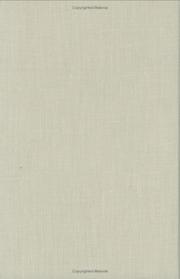| Listing 1 - 2 of 2 |
Sort by
|
Book
ISBN: 9789004339699 9004339698 9789004339705 9004339701 Year: 2017 Volume: 402 3 Publisher: Leiden, The Netherlands ; Boston, [Massachusetts] : Brill,
Abstract | Keywords | Export | Availability | Bookmark
 Loading...
Loading...Choose an application
- Reference Manager
- EndNote
- RefWorks (Direct export to RefWorks)
Authorship and Greek Song is a collection of papers dealing with various aspects of authorship in the song culture of Ancient Greece. In this cultural context the idea of the poet as author of his poems is complicated by the fact that poetry in archaic Greece circulated as songs performed for a variety of audiences, both local and “global” (Panhellenic). The volume’s chapters discuss questions about the importance of the singers/performers; the nature of the performance occasion; the status of the poet; the authority of the poet/author and/or that of the performer; and the issues of authenticity arising when poems are composed under a given poet’s name. The volume offers discussions of major authors such as Pindar, Sappho, and Theognis.
Greek poetry --- Oral tradition --- History and criticism --- Authorship --- Oral interpretation of poetry --- Griechisch. --- Lyrik. --- Autorschaft. --- History --- Poésie grecque --- Poésie --- Tradition orale --- Congresses. --- Congresses --- Histoire et critique --- Congrès --- Art d'écrire --- Lecture publique --- Histoire --- Tradition, Oral --- Oral communication --- Folklore --- Oral history --- Poetry --- Poetry reading --- Reading poetry aloud --- Greek literature --- Oral interpretation --- Poésie grecque --- Poésie --- Congrès --- Art d'écrire --- Greek poetry - History and criticism - Congresses --- Greek poetry - Authorship - Congresses --- Oral tradition - Greece - Congresses

ISBN: 0674962605 0674020464 9780674020467 9780674962606 0674261887 Year: 1997 Volume: 1 Publisher: Cambridge : Harvard University Press,
Abstract | Keywords | Export | Availability | Bookmark
 Loading...
Loading...Choose an application
- Reference Manager
- EndNote
- RefWorks (Direct export to RefWorks)
Written Voices, Spoken Signs is a stimulating introduction to new perspectives on Homer and other traditional epics. Taking advantage of recent research on language and social exchange, the nine essays in this volume focus on performance and audience reception of oral poetry. These innovative essays by leading scholars of Homer, oral poetics, and epic invite us to rethink some key concepts for an understanding of traditional epic poetry. Egbert Bakker examines the epic performer's use of time and tense in recounting a past that is alive. Tackling the question of full-length performance of the monumental Iliad, Andrew Ford considers the extent to which the work was perceived as a coherent whole in the archaic age. John Miles Foley addresses questions about spoken signs and the process of reference in epic discourse, and Ahuvia Kahane studies rhythm as a semantic factor in the Homeric performance. Richard Martin suggests a new range of performance functions for the Homeric simile. And Gregory Nagy establishes the importance of one feature of epic language, the ellipsis. These six essays centered on Homer engage with fundamental issues that are addressed by three essays primarily concerned with medieval epic: those by Franz Bäuml on the concept of fact; by Wulf Oesterreicher on types of orality; and by Ursula Schaefer on written and spoken media. In their Introduction the editors highlight the underlying approach and viewpoints of this collaborative volume.Reviews of this book: "Despite its wide range of topics and approaches, the volume has a clear thematic focus. All contributors seek to leave behind the more formal concerns of past generations of scholars and aim instead at an understanding of orality as that which is (conceptually or actually) close, immediate, or performed. In their joint search for the new picture, classicists, linguists, and medievalists discover a range of different 'oralities'." --J. Haubold, Classical Review
Epic poetry --- Literature, Comparative --- Mythology, Greek, in literature --- Written communication --- Oral interpretation of poetry --- Oral-formulaic analysis --- Oral tradition --- History and criticism --- Theory, etc. --- Congresses. --- Greek and medieval --- Medieval and Greek --- Comparative literature --- Theory, etc --- Poésie épique --- Littérature comparée --- Poésie --- Communication écrite --- Analyse des formules orales --- Tradition orale --- Congresses --- Histoire et critique --- Théorie, etc. --- Congrès --- Grecque et médiévale --- Lecture publique --- Homer --- Criticism and interpretation --- Greek and Medieval --- Formulaic analysis, Oral --- Poetry reading --- Reading poetry aloud --- Heroic poetry --- Tradition, Oral --- Oral communication --- Folklore --- Oral history --- Folk literature --- Poetry --- Written discourse --- Written language --- Communication --- Discourse analysis --- Language and languages --- Visual communication --- Philology --- Methodology --- Oral interpretation --- Homeros --- Homère --- History and criticism&delete& --- Homerus --- Europe --- Epic poetry [Greek ] --- Epic poetry [Medieval ] --- Literature [Comparative ] --- Greece --- Oral tradition - Europe - Congresses. --- Epic poetry, Greek - History and criticism - Theory, etc. - Congresses. --- Epic poetry, Medieval - History and criticism - Theory, etc. - Congresses. --- Literature, Comparative - Greek and medieval - Congresses. --- Literature, Comparative - Medieval and Greek - Congresses. --- Oral interpretation of poetry - Congresses. --- Written communication - Greece - Congresses. --- Oral-formulaic analysis - Congresses. --- Oral tradition - Greece - Congresses. --- Hóiméar --- Hūmīrūs --- Gomer --- Omir --- Omer --- Omero --- Ho-ma --- Homa --- Homérosz --- האמער --- הומירוס --- הומר --- הומרוס --- هومر --- هوميروس --- 荷马 --- Ὅμηρος --- Гамэр --- Hamėr --- Омир --- Homero --- 호메로스 --- Homerosŭ --- Homērs --- Homeras --- Хомер --- ホメーロス --- ホメロス --- Гомер --- Homeri --- Hema --- Pseudo-Homer --- Pseudo Omero --- Epic poetry - History and criticism - Theory, etc. - Congresses. --- Mythology, Greek, in literature - Congresses.
| Listing 1 - 2 of 2 |
Sort by
|

 Search
Search Feedback
Feedback About
About Help
Help News
News